Paul Jun of HelpScout claims that everything hinges on the narrative of your work.
It is human nature to tell stories. From Hamlet to The Hunger Games, narrative is the lifeblood of the human condition. To this end, knowing what you do professionally and how you do it is important, but knowing the story you tell yourself about what you do is evermore meaningful.
If Jun’s claim is true—which I believe it is—then how do you take what’s good, helpful, and customer-focused within that narrative and communicate it to your website visitors?
Your products and services may be great, but to be meaningful that value must be understood by people who want what you’re offering.
For that reason alone, your business needs a blog.
But don’t take my word for it. There’s plenty of hard data to back that up. HubSpot publishes a yearly report that covers everything from marketing to sales.
Here’s what they found.
1. Blogging increases B2B lead generation by 70%.
B2B companies that blog only 1-2X/month generate 70% more leads than those that don’t blog at all. If your company isn’t blogging you are hurting your business because content marketing is an investment that compounds over time.
2. Companies that blog get 97% more inbound links.
You already know getting links to your website is a critical part of earning higher rankings in Google. But without content for people to link to you miss out on a lot of opportunities.
Companies that blog get a whopping 97% more links than companies who don’t. Share on XIf you are serious about SEO, content marketing goes with the territory.
3. 92% of companies who blog multiple times per day have acquired a customer from their blog.
Want more traffic? Blog more. There are numerous benefits to building out a content marketing plan that focuses on publishing regularly.
If you publish more than once per day you exponentially increase the amount of pages in search results. This allows you to target more keywords and rank for long-tail phrases.
Blogging daily helps you:
- Get more pages indexed in Google
- Target a larger list of keyword variations
- Grow the depth of content on your site
- Have more “owned” content to share on social media
Blogging everyday may not be realistic for most companies, but keep in mind that simply having a blog and publishing once per week will have a direct impact on traffic, rankings, leads and sales.
4. 61% of U.S. online consumers have made a purchase based on recommendations from a blog.
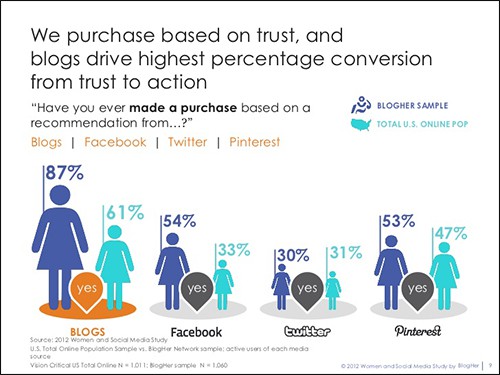
Image Credit: Blogher
People read online and one thing they do read is blogs.
BlogHer is a media company and blog community that gets 37+ million unique views each month across nearly 3,000 blogs. Each year they look at emerging media platforms and measure the purpose, trust and influence levels for blogs and other social media channels.
A 2012 study polled 2,071 women to learn what influences purchasing decisions and blogs were a clear winner.
5. Blogging can increase ROI as much as 13x.
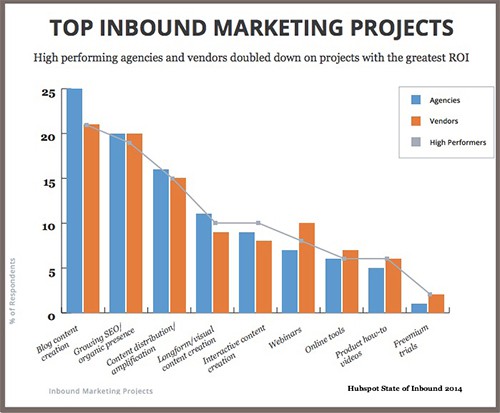
Image Credit: Hubspot
Blogging has a significant impact on website traffic and it continues to be a marketing channel that delivers.
6. Once you write 21-54 blog posts, blog traffic generation increases by up to 30%.
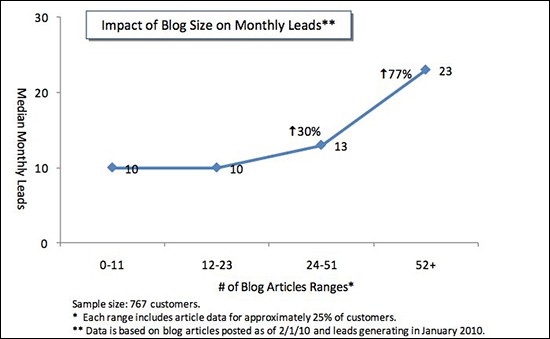
Blog traffic increases dramatically as your site grows in content. The graph below shows that once you write 24-51 posts traffic takes a jump.
The big takeaway?
- Blogging works to generate traffic and leads.
- The more you blog, the more blog traffic you will generate.
Ana Hoffman, a blogger famous for her tips to hack traffic and build an online business, had a few things to say when it comes to blogging for business.
“Blogs can help marketers attract traffic and leads quickly, and marketers who are choosing not to start blogs are simply leaving the traffic for their competition.
“It’s much easier to grow a number of Google indexed pages through a blog vs a static website — a very important factor in how much traffic you will eventually generate.
“Blogs have a tremendous capacity to increase the number of keywords you have high search engine ranking for. The more keywords you rank for, the more traffic you get.”
7. On average, companies that blog receive 434% more indexed pages.
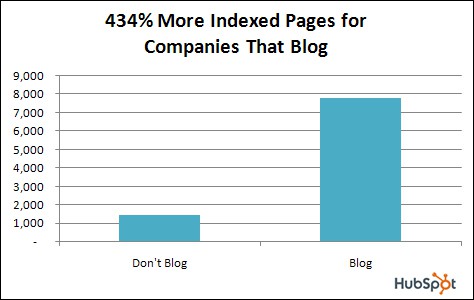
Image Credit: HubSpot
The more pages you have indexed, the more people find you in search. The more people that find you in search, the more people you convert into customers.
The benefits of blogging for business are undeniable:
- 55% more visitors
- 97% more inbound links
- 434% more indexed pages
Remember: The only way you can achieve results like this for your company is to start blogging now. If you understand the value, but do not have the time to commit to blogging you should seriously consider outsourcing blog management and content writing.
8. Small businesses that blog get 126% more lead growth than small businesses that do not blog.
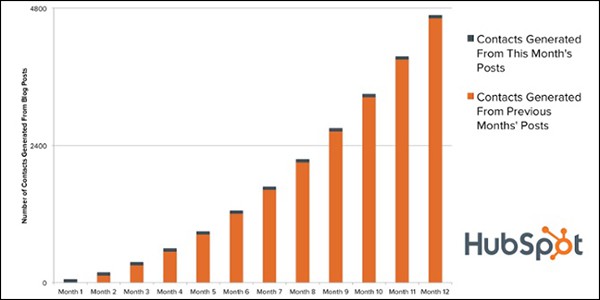
Image Credit: Hubspot
Lead generation is insanely important for growth. Content marketing “wins” compound over time as your content is indexed and starts to rank higher in search. What gets published today can end up generating qualified leads months after.
9. 60% of consumers feel more positive about a company after reading custom content on its site.
What is your perception of a company with a blog? Personally, when I see a company that blogs regularly and puts out useful content I trust them more.
Blogging takes a commitment and in my mind it’s going the extra mile. Sharing your voice and experience with your site visitors allows you to establish credibility and build trust. It’s a good move for any business and it’s clear from the data that it works.
10. Buyers make 57% of all B2B buying decisions before ever contacting a company’s sales force.
People who come to your site aren’t always ready to buy. Smart companies use blogging to educate their customers and open them up to new ideas on how your product can help solve their problems.
The time of “solution sales” has all but gone extinct as more companies publish information online to eliminate the friction of having to talk with a salesperson. People want to research on their own time and not be forced through a linear sales process.
Your company blog can be the best salesperson you have. It removes “sales” pressure by giving people enough information to make the right decision at the right time.
Does your company blog? What challenges do you face?








